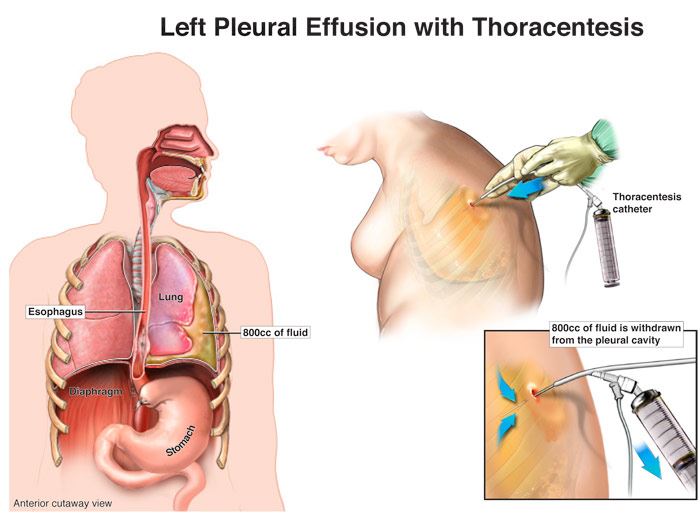Pleural Effusion
Pleural effusion is a condition that causes excess fluid buildup in the lungs, specifically the pleura. The pleura is a thin membrane covering the surface of the lungs and chest wall. Some fluid is always found here, but the amount should be no more than a few teaspoons. Pleural effusion does not always cause problems, but severe cases can result in inflammation and difficulty breathing.
Pleural effusion can be classified as complicated and uncomplicated. Uncomplicated pleural effusions contain fluid without signs of infection or inflammation. They’re much less likely to cause permanent lung problems. As opposed to complicated pleural effusions which contain fluid with significant infection or inflammation. They require prompt treatment that frequently includes chest drainage.

Medical Illustration Copyright © 2019 Nucleus Medical Media, All rights reserved.
Types of Pleural Effusion
There are several types of pleural effusions, each with different causes and treatment options.
- Transudative Pleural Effusions: This type is caused by fluid leaking into the pleural space as a result of either a low blood protein count or increased pressure in the blood vessels.
- Exudative Effusions: This type occurs when the pleura is damaged by trauma, infection or malignancy.
Causes of Pleural Effusion
There are many possible causes of pleural effusion. Some of the most common causes of pleural effusion include:
- Heart failure
- Liver Cirrhosis: A serious degenerative disease that occurs when healthy cells in the liver are damaged and replaced by scar tissue, usually as a result of alcohol abuse or chronic hepatitis.
- Pneumonia: Infection that inflames air sacs in one or both lungs, which may fill with fluid.
- Certain types of cancer (i.e. lung, breast, ovarian, among others).
- Pulmonary embolism
- Kidney Disease: When your kidney does not allow for the usual blood filtering process.
- Inflammatory Bowel Disease: A group of disorders that cause chronic inflammation of your digestive tract.
Symptoms of Pleural Effusion
When pleural effusion is significant enough that it causes inflammation, patients will experience some debilitating symptoms, including:
- Chest pain when breathing deeply
- Fever
- Shortness of breath
- Dry cough
- Difficulty breathing when lying down
Diagnosis of Pleural Effusion
In order to diagnose your condition, your doctor may perform one or more of the following diagnostic tests, which include:
Treatment of Pleural Effusion
Treating the underlying cause of pleural effusion will stop the problem and its source. However, treating the symptoms is sometimes necessary when they are seriously affecting the patient’s quality of life. Treatment options include:
Lifestyle Changes
- Make and keep appointments to see your doctor for routine check-ups and follow-up tests.
Medications
- Anti-Inflammatory medications will help reduce inflammation and relief pain.
- Aspirin will treat pain, fever and inflammation.
